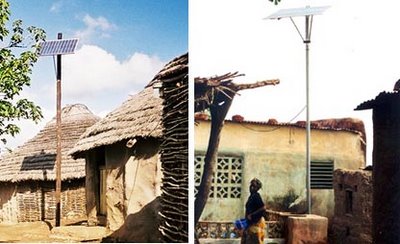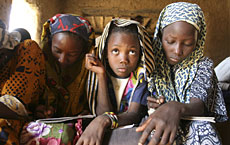In Mali, where light equals life
 Stories about the horrible natural and man-made tragedies inflicted upon the peoples and environment of the African continent seem unending. Earlier this year, the International Livestock Research Institute published a report entitled "Mapping climate vulnerability and poverty in Africa" that concludes that the impacts of climate change on the African continent, where the resources to adequately deal with them are scarce, will likely be considerable.
Stories about the horrible natural and man-made tragedies inflicted upon the peoples and environment of the African continent seem unending. Earlier this year, the International Livestock Research Institute published a report entitled "Mapping climate vulnerability and poverty in Africa" that concludes that the impacts of climate change on the African continent, where the resources to adequately deal with them are scarce, will likely be considerable.However as John Davison points out in the New Zealand Herald story below, some solutions to Africa's plight are well within reach. (GW)
Renewable energy gives hope to Africa's victims of climate change
By John Davison
The New Zealand Herald
Tuesday December 26, 2006
BOUMOU - Kadija Keita, a midwife in rural Mali, West Africa, demonstrates how she used to deliver babies at night, with her head at an angle to hold a torch against her shoulder.
She recalls with sadness one infant who died shortly after birth, because she was unable to identify a problem until it was too late. She simply could not see properly.
But now Kadija's work in Boumou has been transformed. Thanks to help from Christian Aid, her tiny health centre has a solar lighting system. Mothers-to-be and other patients are flocking to her. In the past year alone, she has delivered some 60 babies. "For me, light equals life," says the midwife.
Her story shows how renewable energy can change the lives of poor people in an area far beyond the reach of grid electricity. But as the effects of climate change begin to bite more deeply, creaking health systems in countries such as Mali will need more support.
Carbon emissions in the rich world are causing drought and rising temperatures in the Sahel region. As wells are depleted and the water table falls, access to clean water - the lack of which is responsible for half of all diseases - becomes harder. And as farmers' incomes collapse, they and their families get less to eat, making them more vulnerable to any ailments they contract. According to research by Christian Aid, disease brought about by climate change could take 182 million lives in sub-Saharan Africa alone by the end of the century.
Mali, where droughts are predicted to double in coming decades, is on the front line. Demand for health care is growing so fast that communities are building small health centres like that in Boumou with their own hands.
The Boumou solar-light system, and others in 30 villages, were installed by the Mali Folkecentre (MFC), an organisation funded by Christian Aid.
Dr Ibrahim Togola, MFC's director, has pioneered the use of renewable energy - from the sun, wind and bio-fuel - in poor communities. "Climate change for us is like living with HIV/Aids," he says. "We are seriously sick, we are going to get hurt more and more, and it is not in our control. We have to know how we can adapt our life to these conditions."
The southern village of Tabakoro, where MFC has its training centre, shows the full benefit of renewable technologies for its 2000 people. Solar-powered pumps, connected to a deep bore-hole, supply clean running water. This drastically cuts down the time and effort that women have to spend fetching water. For many, this allows them time to attend evening adult literacy classes - lit by solar power.
The village also boasts a small milling machine, powered by bio-fuel, to take away the strenuous and time-consuming work of pounding maize into flour.
Perhaps the most valued resource, however, is the health centre, complete with solar-powered light and refrigerator. Dr Ismail Diarra, who runs it, is in no doubt about the value of being able to react quickly, and with light to work by. "The night before last a child was brought here with a very high fever in a chronic stage of malaria. Because of the light and the drugs, we were able to save that child's life."


0 Comments:
Post a Comment
<< Home